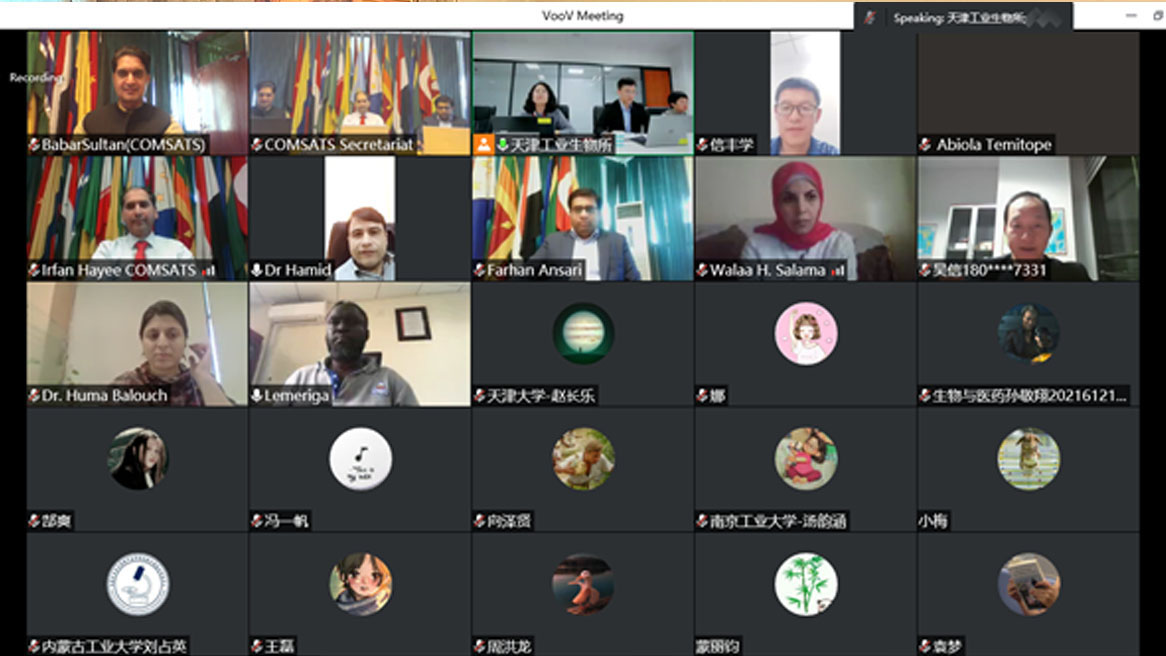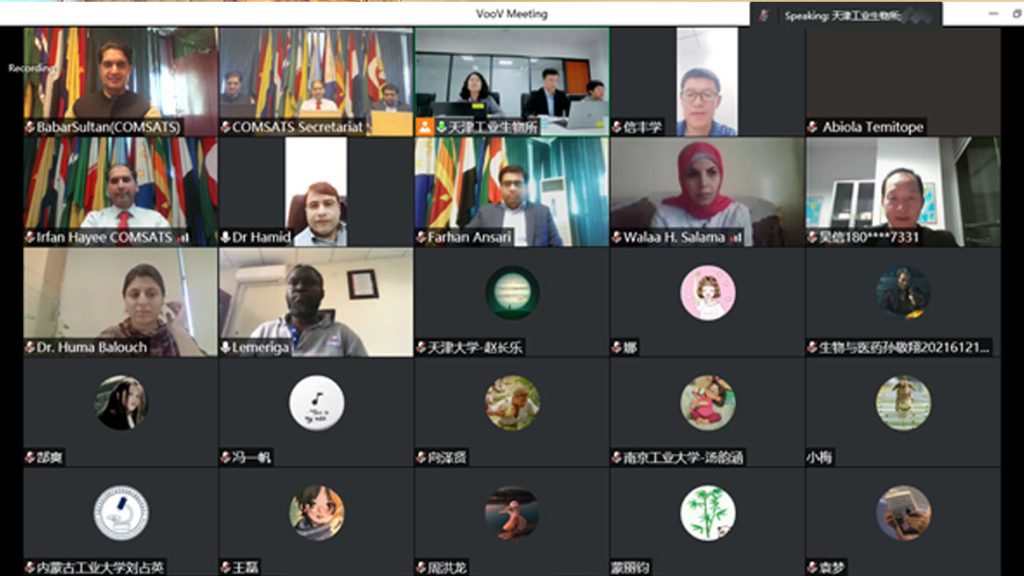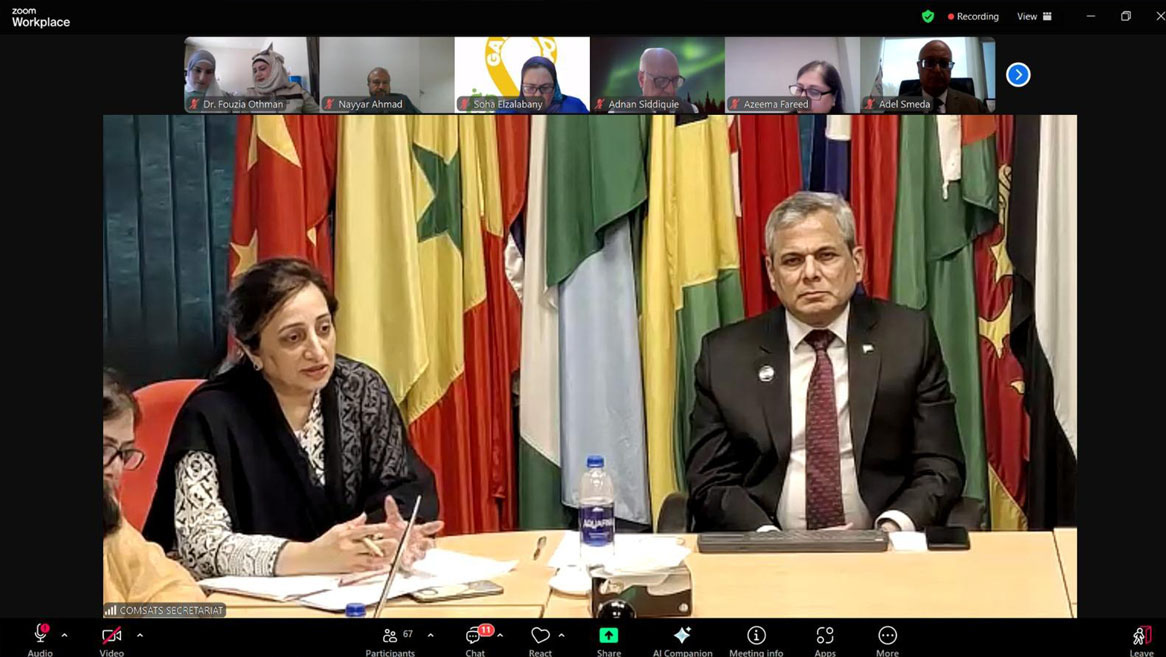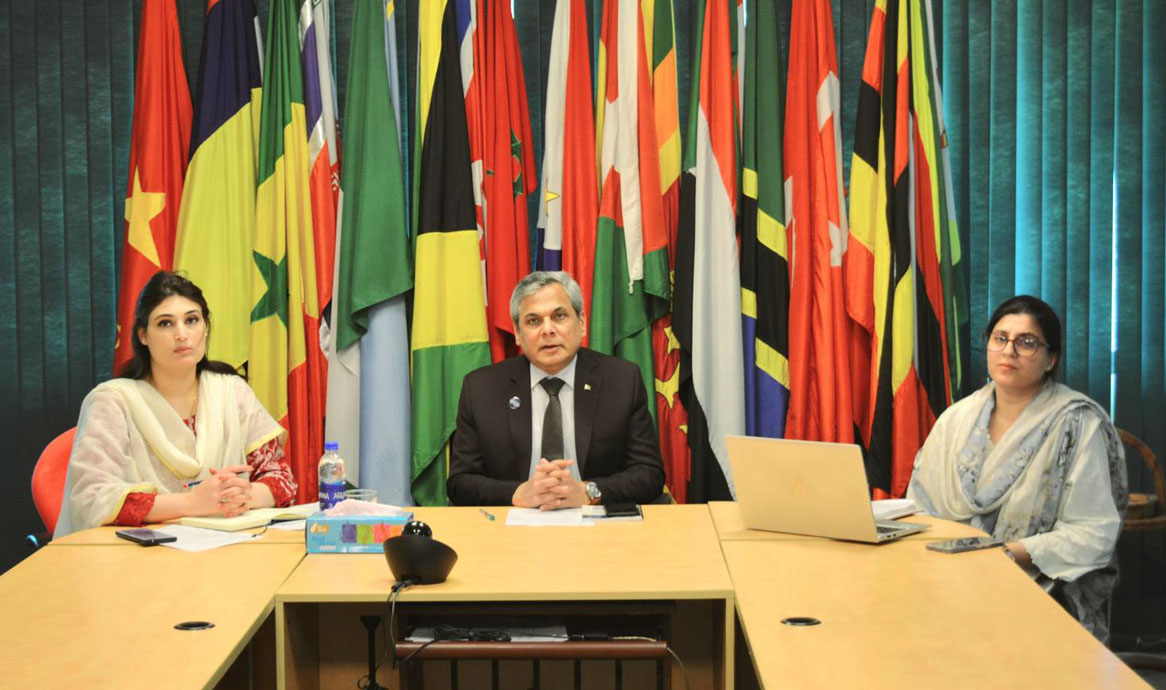From the platform of the COMSATS Joint Centre for Industrial Biotechnology (CCIB), the Tianjin Institute of Industrial Biotechnology (TIB), China, in collaboration with COMSATS, organized an online workshop on ‘Green Biomanufacturing of Bio-based Chemicals’ on 28th October 2022. The workshop was held under CCIB’s Joint R&D Group (JRDG) on ‘Bio-chemicals’ with the aim of promoting dialogue among scientists and enterprises to explore potential cooperation opportunities, particularly joint R&D and industrial collaboration on bio-based chemicals.
The workshop featured two key-note speakers by subject-experts from Japan and Germany, and four talks/lectures by experts from China and Thailand, with online participation of over 150 scientists, researchers and academics from around the world.
Prof. Dr. Jibin Sun, Director of CCIB and Deputy Director-General of TIB, opened the event and exte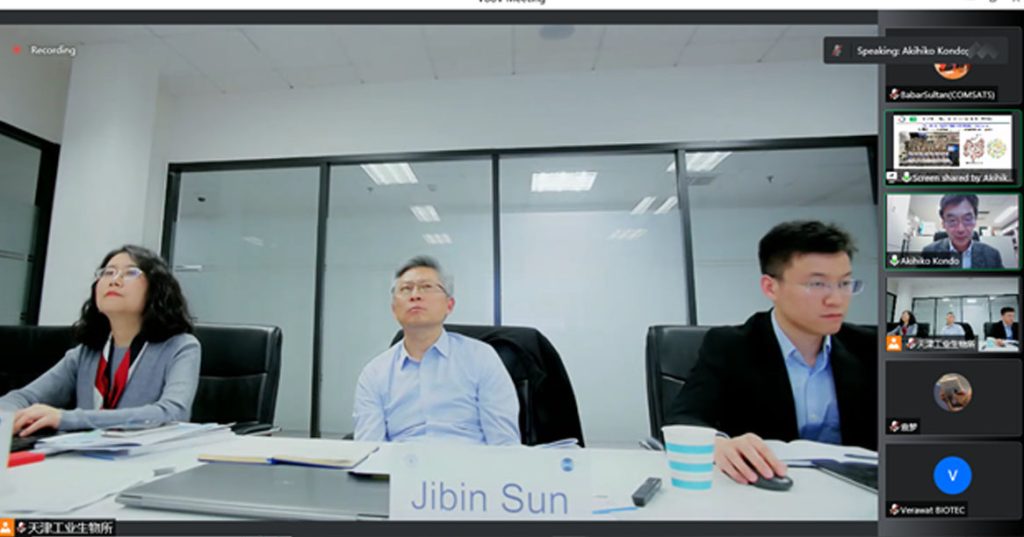 nded a warm welcome to the subject experts and participants. He thanked COMSATS for its collaboration and support for holding this workshop. Prof. Sun noted that biomanufacturing of bio-based chemicals using renewable resources, is an essential technical approach for addressing the current energy and environmental concerns, and therefore use of one-carbon molecules, marine biomass, and agricultural biomass as substrates for chemical biomanufacturing is receiving a lot of attention. Prof. Sun considered biomanufacturing of chemicals a significant area of scientific research and a new paradigm for environment-friendly and low-carbon industrial development. Prof. Sun expressed pleasure on the CCIB’s initiatives to strengthen industrial biotechnology capabilities in COMSATS’ Member States and Belt and Road countries.
nded a warm welcome to the subject experts and participants. He thanked COMSATS for its collaboration and support for holding this workshop. Prof. Sun noted that biomanufacturing of bio-based chemicals using renewable resources, is an essential technical approach for addressing the current energy and environmental concerns, and therefore use of one-carbon molecules, marine biomass, and agricultural biomass as substrates for chemical biomanufacturing is receiving a lot of attention. Prof. Sun considered biomanufacturing of chemicals a significant area of scientific research and a new paradigm for environment-friendly and low-carbon industrial development. Prof. Sun expressed pleasure on the CCIB’s initiatives to strengthen industrial biotechnology capabilities in COMSATS’ Member States and Belt and Road countries.
In his opening remarks, Prof. Dr. Ashraf Shaalan, Chairperson COMSATS Coordinating Council, paid gratitude to TIB for holding this important event from the platform of CCIB. He also welcomed the distinguished experts and participants. Prof. Shaalan stated that chemicals and materials from various biomass sources play important role in reducing our dependence on non-renewable resources. He noted that trees, plants, crops, algae, bacteria and biological waste can be used in different shapes and forms to produce a wide range of bio-based chemicals, fuels, products and intermediates. Prof. Shaalan further noted that bio-based chemical industry has become increasingly profitable, and is ready to take over a large share of the market and opined that the continued development of bio-based chemicals will lead to new feedstock demands, new technology development and new economic opportunities.
A keynote speech entitled ‘Bio-digital Fusion to Establish Biofoundry Technology for Rapid Development of Microbial Cell Factories’ was delivered by Prof. Akihiko Kondo, School of Science, Technology and Innovation, Kobe University, Japan. During his presentation, Dr. Kondo noted that the two areas of biotechnology, i.e., engineering biology and bio-foundry, are advancing towards ‘bio-revolution’ in terms of DNA sequencing, genome engineering, IT/AI technologies, and laboratory automation. Prof. Kondo discussed the design, construction, and testing procedures for bio-foundry platforms, including the construction of genetic components, genome editing, DNA synthesis, and LC-MS analysis accuracy. It was informed that Kondo University also set up a bio-foundry platform that conducts designing, building, and testing procedures and helps produce nanobodies using pichia yeast. Prof. Kondo also highlighted work of different start-ups affiliated with Kobe University, including Bio-Palette, Synplogen, and Bacchus Bio Innovation, and others.
The second keynote speech titled ‘Synthetic and Systems Metabolic Engineering of Corynebacterium Glutamicum for Bioprocesses: a Focus on Nitrogen’, was delivered by Prof. Volker F. Wendisch, Chair, Genetics of Prokaryotes, Faculty of Biology, Bielefeld University, Germany. The speech covered various topics including synthetic biology and its access to nitrogenous products; functionalizing amines including halogenation of amines (7-CI/Br-indole and 7-CI/Br-Truptamine), N-alkylated aminies (reductive alkylamination, intercepting methylamine catabolism, and SAM-dependent), Hydroxylation of amines, L-carnitine production, L-carnitine biosensor, astxanthin, aquaculture sidestream, etc.
The second keynote was followed by a presentation titled ‘Application of Synthetic Microbial Consortia for Biochemicals Production from Renewable Resources’ given by Prof. Fengxue Xin Nanjing, Tech University, China. He shed light on the advantage of Microbial Consortia in Bio-refinery, advances for synthetic microbial consortium, consolidated bioprocessing, domestic microbial consortia, design of efficient microbial consortia, improvement of lignocellulose conversion efficiency, identification of core function strains, Butanol production from Corncob, Lactic acid production from Corncob, chemical production from lignocellulose, application of 3D printing of Biocatalytic living materials, etc.

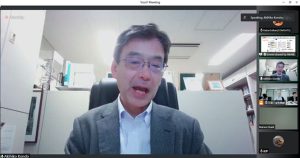
Prof. Verawat Champreda, Director, Biorefinery and Bioproduct Technology Research Group, National Center for Genetic Engineering and Biotechnology (BIOTEC), Thailand, delivered a presentation titled ‘Integrated Utilization of Fractionated Sugarcane Waste to Biochemical by Enzymatic and Microbial Conversion’. During his presentation, he explained the Bio-Circular-Green Economy (BCG) and how the sugarcane, cassava, palm oil, petroleum, and plastic industries etc, are transformed into biorefineries.
Prof. Shuang Li, School of Biology and Biological Engineering, South China University of Technology, China, delivered a presentation titled ‘Efficient Production of Sesquiterpenoid Valencene Using Blue-carbon of Mannitol as Substrate in Saccharomyces Cerevisiae’ He shed light on aspects related to dry matter and carbohydrate composition of brown macroalgae, microbial cell factory, crabtree effect, mannitol, valence nootkatone, valence production by S. cerevisae, etc. She also discussed the effective manufacturing of valence nootkatone utilising a S. cerevisae cell factory from mannitol/brown algae. Prof. Li also explained the two-step adaptive laboratory evaluation, hexanediamine, succinic acid, and aminocaproic acid.
Prof. Yu Wang, TIB, who is also Coordinator of CCIB JRDGroup on ‘Bio-chemicals’, delivered a presentation on the ‘Development of Genome Editing Technologies for Construction of Microbial Strains for Biochemical Production’, during which various topics including biomanufacturing of chemicals from non-food resources; development of ‘CHIP’ through biomanufacturing; genome editing; C. glutamicum; CRISPR/Cas-9 based gene editing method; microbial combinatorial inactivation of multiple genes; base editing; genome engineering based strain development, etc., were discussed. While discussing activities of future of the Joint R&D on Bio-chemicals, he emphasized on demand-driven collaborative research by researchers from member countries having applications in a number of fields, such as industry, agriculture, environment, health, etc. In this regard, Prof. Wang also informed the participants about the challenges that the biochemical industry is currently experiencing.
The technical session followed by discussion sessions which include interesting question-and-answer session pertinent to the events’ theme.
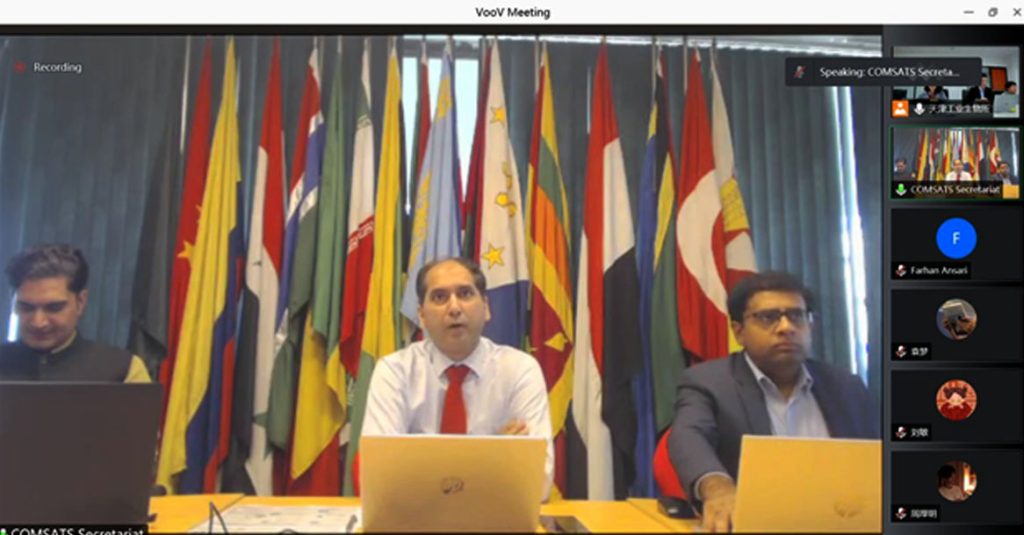
During his concluding remarks, Mr. Irfan Hayee, Additional Director/In-charge (Programmes), COMSATS Headquarters, commended the work done by organizing committee at TIB for organizing the workshop and expressed gratitude to the Director of CCIB and the Coordinator of the JRDG on ‘Bio-chemicals’ for their contributions. He also thanked the distinguished speakers for sharing the most recent knowledge and research in the area of Green Biomanufacturing of Bio-based Chemicals. Mr. Hayee also appreciated the R&D activities of the group and stressed on the importance of such programmes for achieving sustainable development.

